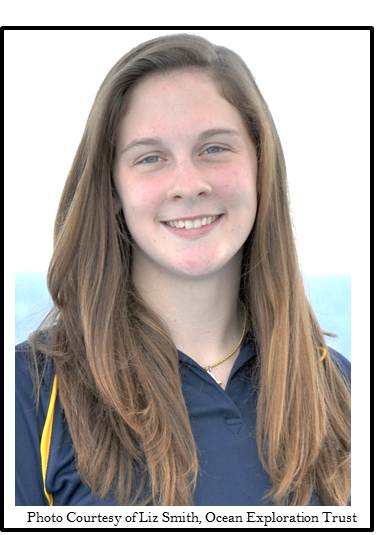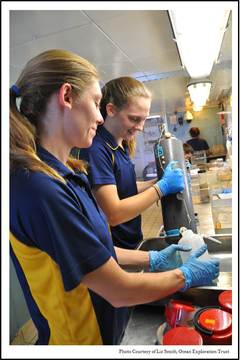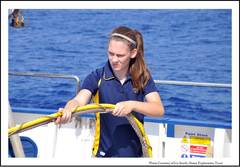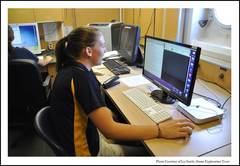
Name Julia Arthur
- Education Graduating High School in Spring of 2013
- Target Audience Middle School

Julia Arthur, a high school senior, had an amazing opportunity to plunge into ocean exploration aboard the Exploration Vessel Nautilus last summer and hasn't come up for air yet. Read on to learn why Julia's work last summer is making such a splash!
This past summer (July and August 2012) I spent 5 weeks at the University of Rhode Island's Graduate School of Oceanography working on a shore-based ocean research project. Part of the overall shore-based project included 10 days aboard Exploration Vessel (E/V) Nautilus off the coast of Turkey exploring and interpreting data we collected on an underwater mountain range in the Mediterranean Sea.
Oceanography working on a shore-based ocean research project. Part of the overall shore-based project included 10 days aboard Exploration Vessel (E/V) Nautilus off the coast of Turkey exploring and interpreting data we collected on an underwater mountain range in the Mediterranean Sea.
Dr. Robert Ballard, captain of the (E/V) Nautilus, gave a presentation at the Office of Naval Research (ONR) in Arlington, Virginia (VA). While he was in VA, the Vice President and Director of Programs from his company, Ocean Exploration Trust, stopped by my school to observe our labs and our research. They chose to visit our school because we focus largely on science and technology and we do a lot of really interesting research in our labs. They were impressed with the research we were doing, and sent an email to my research lab director inviting her to encourage students to apply for this summer research project aboard the (E/V) Nautilus. I applied and got the internship and the rest is history.
Dr. Ballard's team gave us (interns) a project to do, which basically involved reviewing the data collected by a remotely operated vehicle (ROV) called Hercules. They already had a specific scientific method they were using on the expedition, so it was really just a case of us learning their method and applying it to our assigned project. Hercules collects a constant stream of data every day and from every dive and the way the data streams appear is just numbers and letters on a page, which is really frustrating to look at. So, our project was to take the sheets of numbers and letters collected and turn it into visual representations of data. We made charts and graphs and 3-D maps that were easy to interpret and useful.
I think it means being brave and putting yourself out there. Identifying a need in the world and trying something new to solve the problem is innovative.
 I've always really liked math and English. With math, there is always a right or wrong answer and I like that, but I'm also a very auditory person. I love things that sound good like music and books. I guess I like both math and English equally, but for very different reasons.
I've always really liked math and English. With math, there is always a right or wrong answer and I like that, but I'm also a very auditory person. I love things that sound good like music and books. I guess I like both math and English equally, but for very different reasons.
I definitely spend a lot of time doing homework, but I love the water too. I row on the crew team and hope to continue rowing when I go to college. Fingers crossed!
I've always enjoyed math - if you sit down and do a problem correctly, you will always get the right answer. But, I would say my love for STEM really happened this summer aboard the (E/V) Nautilus. All of my teachers and counselors in school have always told me to pursue a field in STEM, but no one ever explained why, how or which field to pursue. This summer was great because it was an opportunity to really experience what my life would be like if I choose a career in oceanography. A post-doctoral fellow who often helped our team this summer really became a role-model for me and helped me learn why deep sea research is important and what steps to take if I want to continue down this path. Now that I understand how to make a career out of ocean exploration, I'm looking into undergraduate geology programs and then probably onto graduate oceanography programs.
Taking a broad spectrum of electives is really helpful. The core math and science classes are important, but electives will introduce you to a lot of different fields and may help you figure out what you like or don't like. Not a lot of schools offer this, but I had the opportunity to take marine biology and it really reinforced how much I like the water.
The great thing about middle school is that there are a lot of opportunities to explore different fields. In terms of oceanography experience, check out opportunities through NOAA (National Oceanic and Atmospheric Administration). Also, if you live close to the water - spend some time exploring it.
Everything! I'm currently in the middle of applying to colleges. My top places for schools right now are Brown and the Naval Academy, which are both really impressive schools. In June of 2013 I graduate from high school and my whole world will change. And, when I'm done with college I have to find a job and make a place for myself - it's all so vastly open right now. It excites me and frightens me all at the same time.
the Naval Academy, which are both really impressive schools. In June of 2013 I graduate from high school and my whole world will change. And, when I'm done with college I have to find a job and make a place for myself - it's all so vastly open right now. It excites me and frightens me all at the same time.
I want to be remembered as passionate in every sense of the term and every facet of my life. I want to be passionate about work and passionate about my relationships with people. There is a quote from Andy Warhol that says "you need to let the little things in life that would ordinarily bore you suddenly fascinate you." That's the philosophy I try to live by.
(adapted from nautiluslive.org)
Meet Wen-lu Zhu! She works as a scientist studying deep sea rocks in hy…